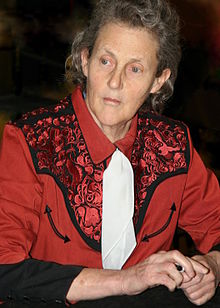Dr. Temple Grandin
| Temple Grandin | |
|---|---|

Grandin in 2011
|
|
| Born |
Mary Temple Grandin August 29, 1947 Boston, Massachusetts, U.S. |
| Alma mater | |
| Known for |
|
| Website | templegrandin.com |
| Scientific career | |
| Fields | |
| Institutions | Colorado State University |
Mary Temple Grandin (born August 29, 1947) is an American professor of animal science at Colorado State University, consultant to the industry on animal behavior, and autism spokesperson. She is one of the first individuals on the autism spectrum to publicly share insights from her personal experience of autism. She invented the "hug box" device to calm those on the autism spectrum. In the 2010 Time 100, an annual list of the 100 most influential people in the world, she was named in the "Heroes" category. She was the subject of the award-winning, semi-biographical film, Temple Grandin.
Temple Grandin was born in Boston, Massachusetts, into a wealthy family. Her mother is Anna Eustacia Purves (now Cutler), an actress, singer and granddaughter of the co-inventor for the autopilot aviation system (John Coleman Purves), with a degree in English from Harvard University. Her father was Richard McCurdy Grandin who died in 1993 in California, a real estate agent and heir to the largest corporate wheat farm business in America at the time, Grandin Farms. Grandin's parents subsequently divorced when she was 15, and her mother eventually went on to marry Ben Cutler, a renowned New York saxophonist, in 1965 (when Grandin was 18 years old). Grandin has three siblings - two sisters and a brother, with Grandin being the oldest. Grandin has described one of her sisters as being dyslexic. Her other sister is a sculptor and her brother a banker.John Livingston Grandin (Temple's paternal great grandfather) and his brother William James Grandin, were French Huguenots who drilled for oil, intending to cut a deal with John D. Rockefeller, but the latter kept him waiting too long so he walked out before Rockefeller arrived. Then they went into banking and when Jay Cooke's firm collapsed they got thousands of acres of undeveloped land in North Dakota as collateral. They set up wheat farming in the Red River Valley with dormitories for the workers; the town of Grandin, North Dakota, is named after John Livingston Grandin. Although raised in the Episcopal religion, Temple Grandin early on gave up on a belief in a personal deity or intention in favor of what she considers a more scientific idea of God.
...
Wikipedia
